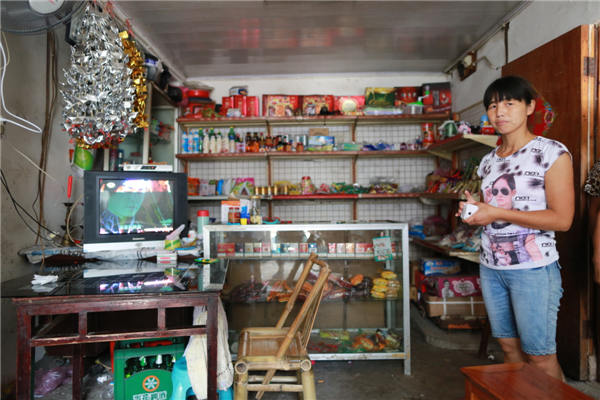Green, sleepy and longing for the city
By Satarupa Bhattacharjya ( China Daily ) Updated: 2015-09-05 08:03:22
 |
|
Hu Liqin, a villager runs a small shop in Jinfu village in Yiwu. |
Outsiders have long associated Zhejiang natives with business acumen, pointing to the existence of a free market in Yiwu four centuries ago and to how the county has taken advantage of late Chinese leader Deng Xiaoping's economic reforms agenda since the 1970s. Many of China's billionaires have roots in the province.
Today, the province is the country's most affluent after Guangdong in the south and Jiangsu and Shandong in the east. And yet some parts of Yiwu "have been unable to catch up with the breakneck development of its commodity economy", says Wang Gang, deputy director for publicity in Yiwu's municipal government.
In his younger days, JinGuoyuan, 61, sold fake jewelry in the city, but he returned to farming fruit in the village after his venture failed. The oranges, peaches and berries from the orchards of Jinfu are sold in the wholesale fruit market in Yiwu city, and villagers mainly consume the farm vegetables themselves.
"Transport and housing are improving," Jin says, standing beside his wife, who tends to drying fish.
Dozens of houses with walls painted white line the narrow alleys of his village. People used waterways to travel outside earlier, but now there are roads and a few primary schools in the area. Yiwu city has urbanized over the past decade alongside the growth in its commodity trade.
Exports, the backbone of business in Yiwu, grew 45 percent in the first half of the year as compared with 32 percent for the 2013-14 financial year, Wang Birong, director-general of Yiwu's Bureau of Commerce told China Daily earlier.
From January to July this year, exports were worth $15.4 billion, and for the whole of last year they made $23.7 billion, he said.
JinGuohui, a middle-aged schoolteacher from Jinfu, says that the site of the air-conditioned, multilevel International Trade Mart was a jimao (bazaar) where street snacks and noodles were sold in the late 1970s. Of late, the villages here have started to see additional income trickle from tourism activities such as fruit picking.
There are about 20 villages in the vicinity.
When many elderly residents of rural Yiwu are not farming fruit they look after their grandchildren left behind by parents working in the city. But unlike in most other Chinese cities, young couples in Yiwu are likely to live closer to their children and parents because of relatively shorter distances between the city and countryside.
One such grandmother is Shen Lizhen, 57, who cares for her daughter's toddler. She and her husband are lifelong farmers who like the quietness of their village. Their children live in Yiwu city, a place she describes as expensive, and says there is little influence of the market on their lives except for infrastructure building.
"Fruit could be selling better," Shen says.
She uses a hand-held fan for relief on the hot and humid late-July day, intermittently asking her grandson to "watch out" as he tries to negotiate his way through her house that is scattered with furniture and winter bedding. Shen looks busy, tired and older than her years.
The next village, Xinlou, is smaller, with a population of about 400. It is slightly better developed than Jinfu, going by the concrete in roads and buildings, including on the edges of a pond. There are more vegetable farms than fruit here, and handicraft from the village is sold in Yiwu city.
But the profile is similar: home to the older generations and the very young.
It is close to noon, and the sunny village streets are deserted. Through the open door of a house, a woman is seen making a basket with flattened plastic straws. A poster on one of her walls is a collage of photos of the seven members of the Standing Committee, the highest decision-making body of the Communist Party of China.
The singing of crickets in the distance adds to the village's sedate charm.
Lou Bingquan, a local construction worker, hurries down the street outside the woman's house. He is among the village's few residents to have a job that is different from farming, household chores or babysitting. But even for Lou, the lure of city life is undeniable, he says, stopping briefly.
The scene ina corner shop offers a glimpse into the lives of some others.
Three women in Western clothing are seated around a table with playing cards in hand. One has a babbling child for company. The floor beneath their feet is strewn with the discarded casings of sunflower seeds, popular munchies in China. The air rings with their laughter as the women seek to outwit each other in the game.
They are all close friends of the shop owner, Hu Liqin, 40.
"The village is quiet and comfortable," Hu says. "But I want to go to Yiwu city for more money...People there are richer."
The grocery store that provides for her subsistence and her teenage son's education at a school somewhere outside the village are keeping her from taking flight-for now.
Yan Yiqi contributed to this story.
|
|
|
|
|
|
|
|

























 Raymond Zhou:
Raymond Zhou: Pauline D Loh:
Pauline D Loh: Hot Pot
Hot Pot Eco China
Eco China China Dream
China Dream China Face
China Face






